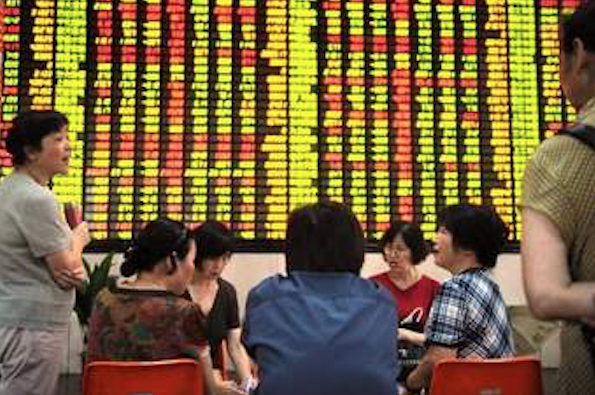Asian shares shook off a quiet start to reach new 19-month highs on Monday before the expected signing of a Phase 1 United States-China trade deal, although markets have yet to see the details of the agreement.
European bourses looked set to take a more sceptical view of the deal, with pan-region Euro Stoxx 50 futures down 0.05 percent at 3,778, German DAX futures up just 0.01 percent at 13,493, and FTSE futures eking out a 0.02 percent rise to 7,531.
US S&P 500 e-mini stock futures were looking more bullish, rising 0.31 percent to 3,274.8, just short of record highs.
On Monday afternoon in Asia, MSCI's broadest index of Asia-Pacific shares outside Japan was 0.61 percent higher, touching its highest point since June 2018.
South Korea's trade-sensitive Kospi added 1.01 percent and Hong Kong's Hang Seng was up 0.95 percent, while Taiwan shares added 0.74 percent in the first trading day after Taiwan re-elected President Tsai Ing-wen by a landslide on Saturday.
Mainland Chinese shares lagged the regional index after China's major equity indexes logged their sixth consecutive weekly rise last week, the longest such streak since the first quarter of 2019.
The benchmark Shanghai Composite Index was up 0.19 percent in the afternoon, turning around from losses earlier in the session.
Investors in China are looking ahead to trade and economic growth data due this week, which is expected to shed more light on some early signs of economic improvement after the country logged its slowest pace of growth in nearly 30 years in the third quarter.
But in a sign of the persistent weakness in the Chinese economy, the country's top car industry body reiterated its prediction that sales will likely shrink for the third straight year in 2020.
The China Association of Automobile Manufacturers (CAAM) expects a 2 percent fall in vehicle sales. That would compare with an 8.2 percent drop last year, when sales were pressured by new emission standards in a shrinking economy also contending with tit-for-tat import tariffs with the US.
Japan's Nikkei was closed for a holiday. It fell sharply early last week when Iran attacked bases hosting US military in Iraq, only to rally almost 1,000 points when the two countries stepped back from hostilities.
The main event of the week will be the signing of the Phase 1 trade deal between the US and China on Wednesday. The Trump administration has invited at least 200 people to the White House for the ceremony.
"A calmer geopolitical backdrop and the signing of the US-China Phase 1 agreement is, on balance, favourable for global growth," said Joseph Capurso, an FX strategist at CBA.
"However, the 86-page Phase 1 agreement has not yet been made public. There are doubts how comprehensive the deal is, and whether the Phase 1 agreement will be implemented in full by both governments."
Washington has reserved the right to reimpose tariffs if it judges China is not abiding by the deal.
"If there is any surprise from the Phase 1 deal ... that may actually cause some kind of volatility," said Tommy Xie, economist and head of greater China research at OCBC in Singapore.
"People are really focused on whether China is really committed to purchase additional $200 billion in goods and services from the US over the next two years ... there's not much commitment from China yet."
Xie said China's fourth-quarter and 2019 full-year GDP figures, due on Friday, are also likely to draw scrutiny as investors look for signs that improvements seen in recent manufacturing surveys are reflected in broader growth and investment figures.
Perfect for risk
Wall Street slipped and bonds rallied on Friday when data showed US nonfarm payrolls missed forecasts with a rise of 145,000, while wages and hours worked were soft.
"This is the perfect employment report for the Fed to continue to run the economy 'hot', as views on the natural rate of unemployment continue to drop," said Alan Ruskin, Deutsche Bank's global head of FX strategy. "This is perfect for risky assets."
On Monday, the euro gained 0.06 percent to $1.1126, up from a $1.1083 low on Friday. Support comes in around $1.1060, while the recent peak at $1.1239 marks stiff resistance.
The dollar was firm on the yen at 109.62 but faces tough resistance around 109.70 where rallies have repeatedly failed in the past couple of months.
Against a basket of currencies, the dollar was barely higher at 97.373, well within the recent trading range of 96.355 to 97.817.
The pound dipped 0.24 percent to $1.3028 after Bank of England policymaker Gertjan Vlieghe said he will vote for a cut in interest rates later this month, barring an "imminent and significant" improvement in the growth data.
Spot gold slipped 0.48 percent to $1,554.48 per ounce, having hit a seven-year top last week of $1,610.90 at the height of Iran-US tensions.
Oil prices were slightly firmer after suffering the first weekly loss since late November.
Brent crude futures were up 5 cents at $65.03 a barrel, while US crude added 11 cents to $59.15 a barrel.
SOURCE: REUTERS NEWS AGENCY



